The Curse of the Werewolf (1961)
Directed by: Terence Fisher
Written by: Anthony Hinds, Guy Endore
Starring: Anthony Dawson, Catherine Feller, Clifford Evans, Oliver Reed
UK
AVAILABLE ON BLU-RAY AND DND
RUNNING TIME: 93 min
REVIEWED BY: Dr Lenera, Official HCF Critic
In 18th Century Spain, a beggar is imprisoned by Marques Siniestro after making inappropriate remarks at the nobleman’s wedding. Fifteen years later, the decrepit Marques makes advances on the jailer’s daughter and, when she refuses him, has her thrown into the dungeon with the beggar, who, driven mad by his long confinement, has become like a wild animal. He rapes her and then dies. The girl is sent to “entertain” the Marques but kills him and is found in the forest by the gentleman-scholar Don Alfredo Corledo who lives alone with his housekeeper Teresa. She dies after giving birth to a baby on Christmas Day, a cursed day for children to be born. Calling him Leon, Alfredo and Teresa raise the boy, who seems to be plagued by strange dreams. An early hunting incident gives him a taste for blood, which he struggles to overcome, and soon, a number of goats are found dead….
I reckon that, if most horror fans were asked to name the best werewolf film, An American Werewolf In London would probably be top of the list, closely followed by The Howling, Ginger Snaps and The Wolf Man. The Curse Of The Werewolf would possibly come next. I’m also very partial to Wolf, The Wolfman, and Legend Of The Werewolf. I would probably agree that An American Werewolf In London might be the best of them, but it’s The Curse Of The Werewolf which remains my personal favourite. Sadly it’s Hammer’s only werewolf movie. It may only feature around ten minutes of actual lycanthrope action, something which probably disappoints many first time modern viewers, and which definitely disappointed me the first time I saw it, but it’s quite a moving effort, more reminiscent of a Greek tragedy than anything else in its fatalism, and I think it’s one of those Hammer films that improves with each viewing. Perhaps, in the end, it’s a little too ambitious for Hammer to realise to its full potential, but a bit of over-ambition is still a praiseworthy thing, especially for a studio whose output was mostly considered as purely commercial, not to mention exploitative, ventures at the time. If The Curse Of The Werewolf had not been made by Hammer, it would have probably received a much better critical reception, as it’s clearly trying to do more than just frighten. Its epic pretensions and sober handling, in particular, make it hold up very well today. And it has an astoundingly strong performance from a young Oliver Reed.
Universal owned the film rights to Guy Endore’s 1933 novel The Werewolf Of Paris, an epic narrative spanning several historical periods, and subcontracted it to Hammer. The book was drastically condensed by writer John Elder, a pseudonym for producer Anthony Hinds who had begun to pen scripts for Hammer but had to hide the fact because the unions would have been unhappy to find out he’d been writing as well as producing. Hammer then became more interested in a project called The Inquisitor, about the Spanish Inquisition taking over in a small town, but upon hearing that the Catholic Church would probably ban it, they gave up on it and the werewolf script, which by now bore virtually no resemblance to the novel, was reworked to incorporate the large Spanish village set that had been built. Head censor John Trevelyn saw the script and had only one complaint. Originally the beggar in the early scenes was a werewolf and his rape would have been watched by the Marquis, but Trevelyn said that: “You can have fangs or relations with the girl, but not both”. However, the film came out in a bad climate for the horror film in the UK, with some pressure groups calling for them to be all banned, so nearly three minutes of footage from murder scenes, including almost all of the film’s blood, plus shots of dead lambs, the killing of the werewolf, and the Marquis picking a scab from his face, were removed. The US only saw four minor cuts, removing a bullet impacting and some bloody bodies. Billed in both the UK and the US with The Shadow Of The Cat, The Curse Of The Werewolf was a commercial disappointment. I recall the BBC claiming they were showing the complete version of the film around 1990, though they mistakenly aired the usual chopped up edit. Soon after, they showed what was actually the slightly cut US version, the complete version not being shown anywhere for some time after.
Now one of the complaints that some seem to make about this film is the extremely lengthy preamble setting up the main story, which is the main reason that most of the werewolf stuff is relegated to the final third [though we do see the monster’s eyes in the title sequence], but it’s there to show exactly where Leon came from, the social and sexual brutality that can give birth to a monster, and how the decline of his father into an animalistic brute wasn’t really his fault. The only mistake I feel that the film makes here, aside from some not entirely necessary narration from Alfredo, soon to be Leon’s adoptive father and a person who is in some ways the true hero of the story, is that the decrepit, horrible Marquis is killed off too early. Anthony Dawson helps make the character into a truly loathsome creature who is the possibly the most monstrous thing in the picture, but how great would it have been if he’d encountered the werewolf much later on in the story? Fisher doesn’t show the beggar raping the slave girl, but even showing her having huge scratches on her after the event was pretty strong meat for 1961. Richard Wordsworth, who is also excellent as the beggar, a genuinely tragic character in his own right, was asked to put an egg in his mouth and dribble bits out so it looked like he’s literally drooling over the girl. “But keep it tasteful” said director Terence Fisher, most amusingly. What with all this, and then his mother dying just after giving birth to him [though she movingly sees him just before she passes away], it’s no surprise that Leon seems to be cursed, right from when his baptism causes the water in the font to bubble. The story already becomes quite strong because, rather than in most other werewolf movies where the main protagonist is bitten by somebody else, and is therefore struggling against not so much his own nature as a condition given to him by somebody else, Leon is literally fighting against his own background.
Though we get a powerful moment of the boy Leon with fangs trying to break out of his room, the film does indeed hold off on monster thrills for two thirds of its running time, but then we don’t meet the adult Leon until almost half way through. I wish that we’d seen the nightmares that Leon talks about, while the scene of the making of a silver bullet would have had more dramatic power if it had occurred closer to the end of the film. Still, the supposed Spanish setting, which is mostly Bray and a quarry in Egham, is surprisingly convincing, aside from that usual area of Black Park turning up again, and Warren Mitchell’s [this film really does have a variety of fine performances] amusing turn as the animal hunter charged with finding out what is killing off all these sheep is most enjoyable. Leon eventually changes in a brothel, the film daringly suggesting that sexual urges are partly responsible for kicking things off. Even here, The Curse Of The Werewolf dares to hold back; the subsequent werewolf rampage through the town only shows the monster either in shadow or by just his arms, and the kills are brutal but cut away from any real detail, though the amount of blood when we see the prostitute’s body is considerable. We only see the werewolf in full in the climax, Roy Ashton’s make-up adapting the old Lon Chaney look for a more wolf-like appearance, and the finale is an impressive mini-spectacle with Universal-style townspeople turning out to get the monster and Reed’s stunt double climbing all over the buildings. The final scene is perhaps the only moment which really recalls The Wolf Man, with father [though really stepfather here, and come to think of it why does Leon call him and his wife Aunt and Uncle?] having to kill son, and it’s by far the bloodiest scene in the film, though the finale would have been more moving had Leon’s love interest also been present. It’s also a shame that we don’t get a full werewolf transformation, aside from a shot of some rather unconvincing hands changing via dissolves.
The emotional centre of the film is Leon’s romance with Christina, the daughter of his boss. The narrative jumps somewhat from Leon falling in love with her at a distance to the two involved in an affair, as if a few scenes are missing, though it was probably realised that the film was taking an inordinately long time to get to the exciting bits. Indeed, The Curse Of The Werewolf moves at a somewhat torpid pace, but it’s meticulously structured, from the opening and closing moments both being of a bell ringing, to the slight Christian parallels that run throughout the story, even if there can’t help but be a bit of awkwardness in the way it has to establish a new setting and new characters every now and again. While the odd thing creates a chuckle, like the rushed old age makeup on Hira Talfrey which just makes her look like a vampire, not to mention the unintentional guffaws which can’t helped when Reed says: “I had a bit too much to drink”, a lot of care does seem to have been devoted to this production. It’s also probably the first colour effort where cinematographer Arthur Grant really shows what he can do, with fine use of shadows [especially in close-ups of the monster] and colour at times approximating the work of Jack Asher despite Grant never having the time for the meticulous set-ups that Asher liked to indulge in. In particular, the use of bright pink in the brothel is striking. Meanwhile Fisher and editor Alfred Cox employ some particularly hard hitting editing during moments when the werewolf virtually assails the camera.
I don’t think Reed, who was actually suggested for the role by Ashton because he:“Looked like half a wolf when he was getting angry anyway”, has been praised enough for his performance in this film, especially as it was his first starring role. He already has that slightly brutish magnetism and he really gets through to the viewer his character’s torment and the idea of the beast within. Clifford Evans as his adopted father is also very strong as you can see how conflicted he is, as well as his great love for Leon. Kudos also to my favourite ever Michael Ripper appearance, hilarious as a drunk in a bar crying: “It was no ordinary wolf”. I always get genuinely upset when his character meets a nasty end. It’s a shame that the luscious Yvonne Remain is only in the first third of the picture, though Catherine Feller gives it her all as Christina despite obviously being quite a limited actress. Largely ignoring the film’s setting, Benjamin Frankel’s score is quite complex as it incorporates moody dissonance, tragic romance and even some jolly moments [like when Leon is going out into the big wide world] along with the typical barnstorming stuff. Though the various motifs don’t have the simple strength of James Bernard’s efforts, it’s still one of the best Hammer scores. Perhaps the cramped Hammer format wasn’t totally right for such an expansive story as The Curse Of The Werewolf, which could really do with being half an hour longer. Nonetheless, it’s an admirably adult and thoughtful effort which has considerable sadness and downbeat power.

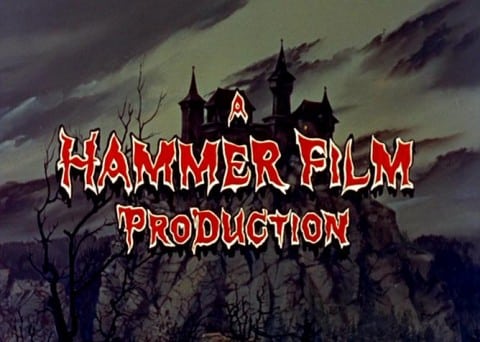
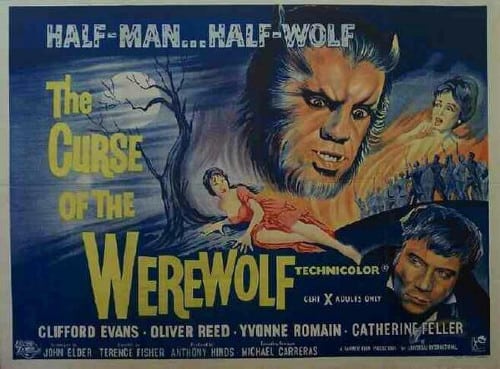
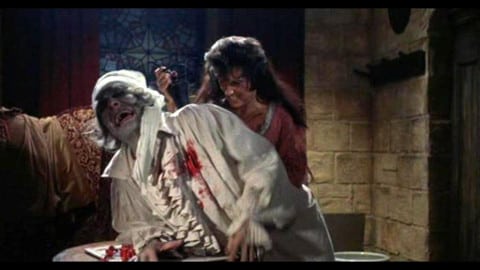
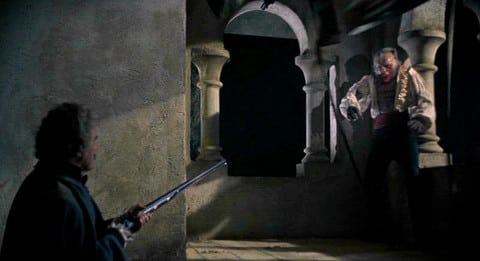



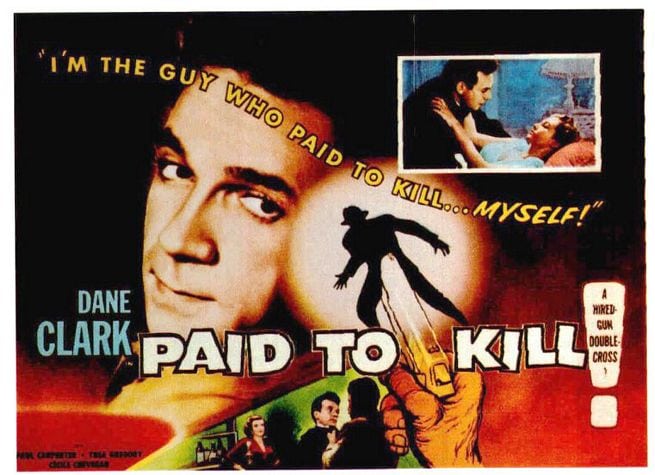
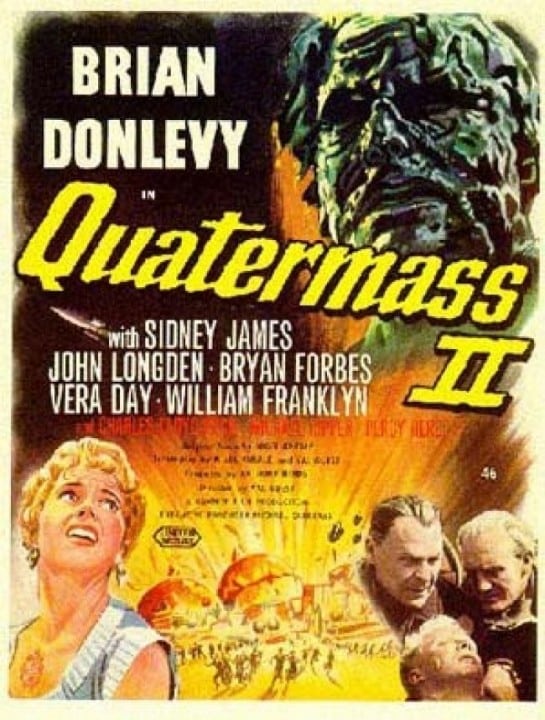
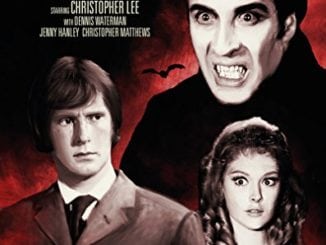
Be the first to comment